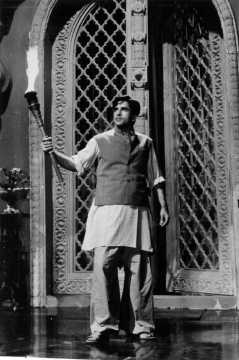Continuing our series on early Hindi films that explored the project of nation-building and of freedom, we look at Yash Chopra's Dharmputra (1961), a film that explored religious identity in the context of the struggle for India's independence.
Countering Hindu extremism through the message of harmony – Yash Chopra’s Dharmputra (1961)
New Delhi - 16 Aug 2018 21:26 IST
Updated : 21:37 IST


Sukhpreet Kahlon
Based on a novel by Acharya Chatursen Shastri, Yash Chopra’s Dharmputra ventured into terrain where few dared to tread, taking up religious fanaticism and secularism as its theme and featuring a Hindu fundamentalist as its protagonist.
One of the earliest, and few, explorations of Hindu extremism in Hindi cinema, the film exposed the bitter reality about blind religious fervour and its heinous consequences.
The film begins in 1925, when the fight for freedom is gaining momentum. The slogans of 'Inquilab zindabad' and 'Hindu-Muslim bhai bhai' accompany the call for independence.
Questioning faith in turbulent times – IS Johar’s Nastik (1954)
Against this backdrop, nawab Badruddin (Ashok Kumar) suddenly calls on Dr Amrit Rai (Manmohan Krishna), his brow furrowed with anxiety about the fate of his daughter Bano (Mala Sinha). Bano had fallen in love with Javed (Rehman), only for the match to be rejected by her father. However, Bano has now realized she is pregnant and the nawab turns to the good doctor for counsel.

Dr Rai and his wife Savitri (Nirupa Roy) are childless and decide to adopt Bano’s child Dilip as their own. The two families remain close. In time, Bano and Javed marry. But Bano learns that she will not be able to bear any more children. This heart-breaking news, along with the death of her father, the nawab, are too much for her to bear and the couple goes abroad for a while.
When they return, Dilip (Shashi Kapoor) is a strapping young man, infused with ardent nationalistic fervour. The divide-and-rule policies of the British have started taking effect and the earlier united slogans have been replaced by 'Hindi, Hindu, Hindustan' and 'Qaid-e-Azam ka elaan, ban kar rahega Pakistan', signalling the growing rift between the communities.
We are introduced to Dilip as he meditates, ascetic-like. Citing religious ideals, he rails against the ‘Western’ habits of his friends, urging them to follow the tenets of their dharm (faith). He recoils in distaste when he learns that his parents’ friends are Muslim. His progressive family is equally bewildered at the growing fanaticism of their son.

In the riots that accompany the Partition of India, Dilip’s staunchly held beliefs come to a head as he is forced to assess the true meaning of religion and nationalism.
Dilip is the embodiment of a ‘Dharmputra’, follower and protector of the faith, and the film tracks his descent into increased radicalization. Through several arguments with his friends and family, we are presented with a spirited critique of Dilip’s views as he is urged to have a balanced and more informed way of looking at religion.
'Beti zyada pyaari hai': The progressive vision in ML Anand’s Lahore (1949)
In one conversation, his mother reminds him of the practice of sati and the treatment of women in Hinduism. In a heated exchange, his father urges for an understanding of religious identity as culture, one that extends beyond bloodlines.
When Dilip states that his culture is in keeping with Hindu culture, Dr Rai responds by calling him uncouth. “Tum culture ka matlab nahin samajhte. Kisi khaas tareeke se khana pakana, pooja-paath karna ya Ganga mein snaan karne ka naam culture nahin. Roohani tarraki ka naam culture hai, aatma ka parmatma ko pehchaanne ka naam culture hai, achchai aur khoobsoorti ki talash ka naam culture hai [You do not understand the meaning of culture. To cook food in a particular way or to offer prayers or take a dip in the Ganga does not constitute culture. Culture lies in spiritual growth, in the soul’s communion with god, in the search for beauty and goodness]."
The hard-hitting dialogues by Akhtar-ul-Iman and lyrics by Sahir Ludhianvi are instrumental in presenting a strong counter to Dilip’s extremist views. The songs 'Ye Masjid Hai Woh Butkhana' and 'Yeh Kiss Ka Lahu Hai Kaun Maraa' hit out at polarization along religious lines.
Film historian Zafar Abid Balani points out that Chopra’s personal life and his experiences during Partition shaped the film and the filmmaker had an emotional attachment to Dharmputra.
Yash Chopra began his career in cinema by assisting his older brother BR Chopra, whose films raised pertinent questions about society and its people.
The younger Chopra’s first film, Dhool Ka Phool (1959), featured an unmarried mother, while advocating communal harmony, especially in the song, 'Tu Hindu banega na Musalman banega, insaan ki aulaad hai insaan banega [You will be neither Hindu nor Muslim, you are the child of a human and that's what you will be]'.
Dharmputra took this thought forward, but the film did not fare well at the box office. There were even reports of clashes breaking out outside some cinema theatres screening the film and Chopra was dismayed by this reaction to his work.
In the context of the current times and increasing violence in the name of religion, Dharmputra’s inquiry into what it means to be an Indian is especially pertinent. Do we regress to the slogan of 'Hindi, Hindu, Hindustan' or embrace the solidarity of 'Hindu-Muslim bhai bhai'? Each of us must find the answers within ourselves, paving the way for the future of our country.
One is reminded of a couplet by the poet Jigar Moradabadi:
Unkaa jo farz hai woh ahle-siyaasat jaanein
Mera paighaam mohabbat hai jahaan tak pahunche.
It is for political leaders to know their duties
My message is one of love, may it reach far and wide.
Related topics
Independence Day








